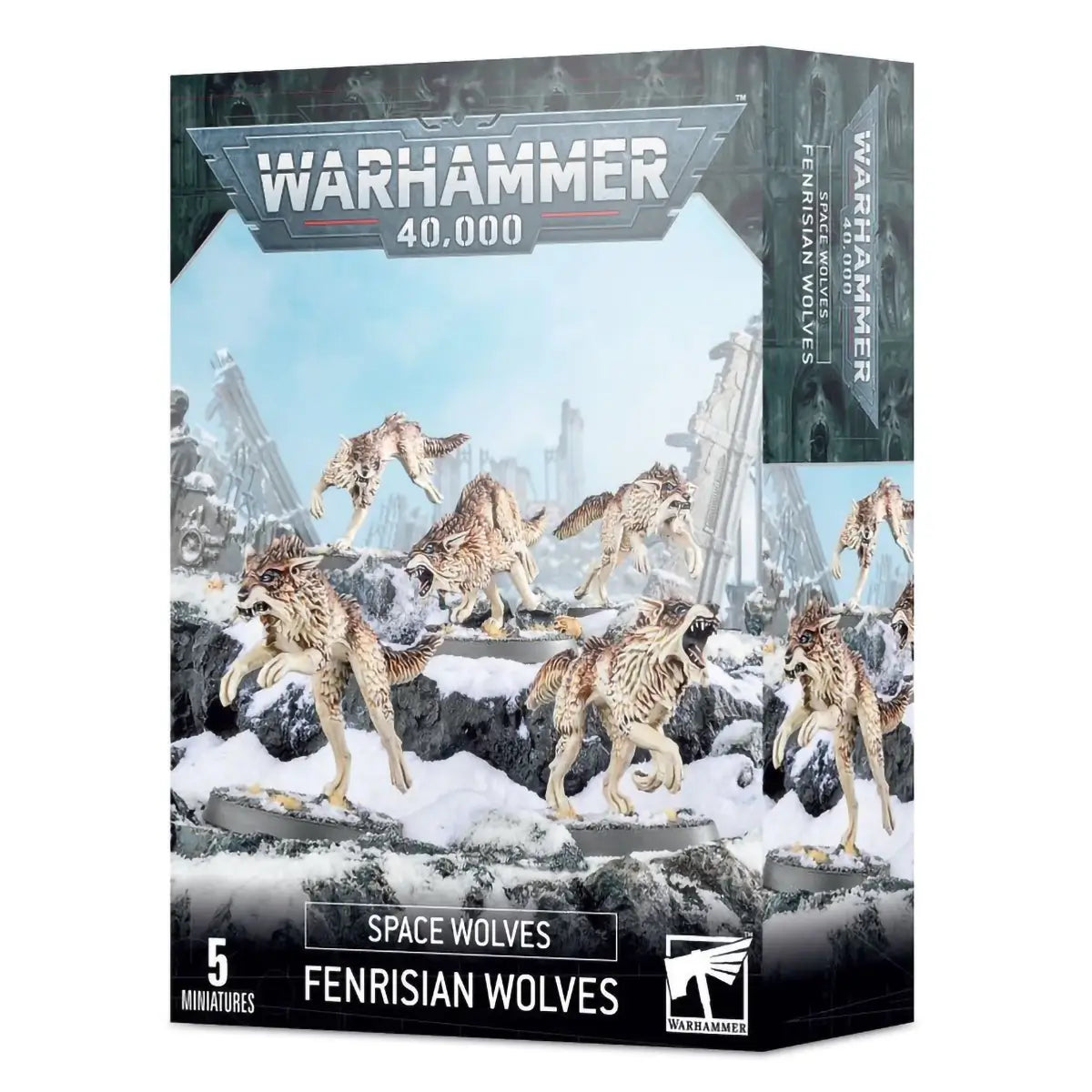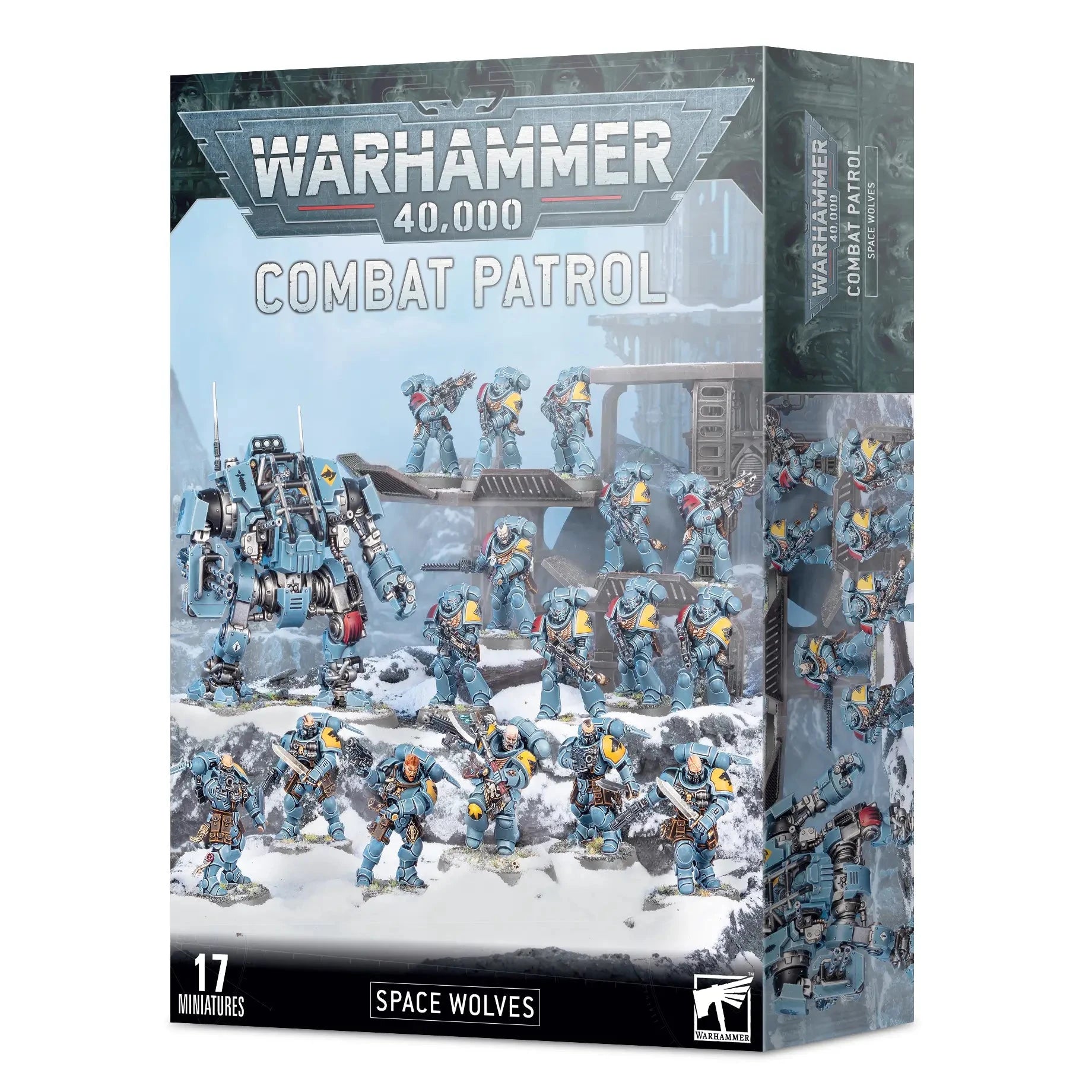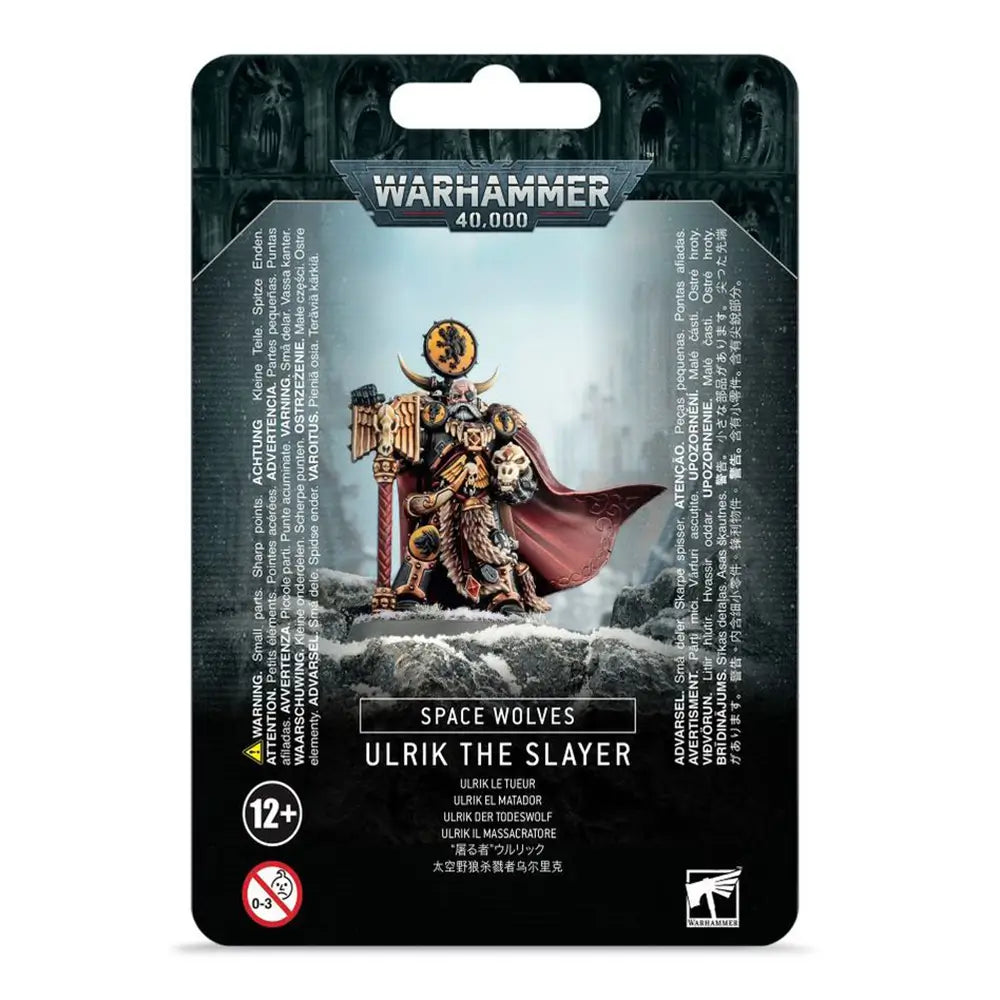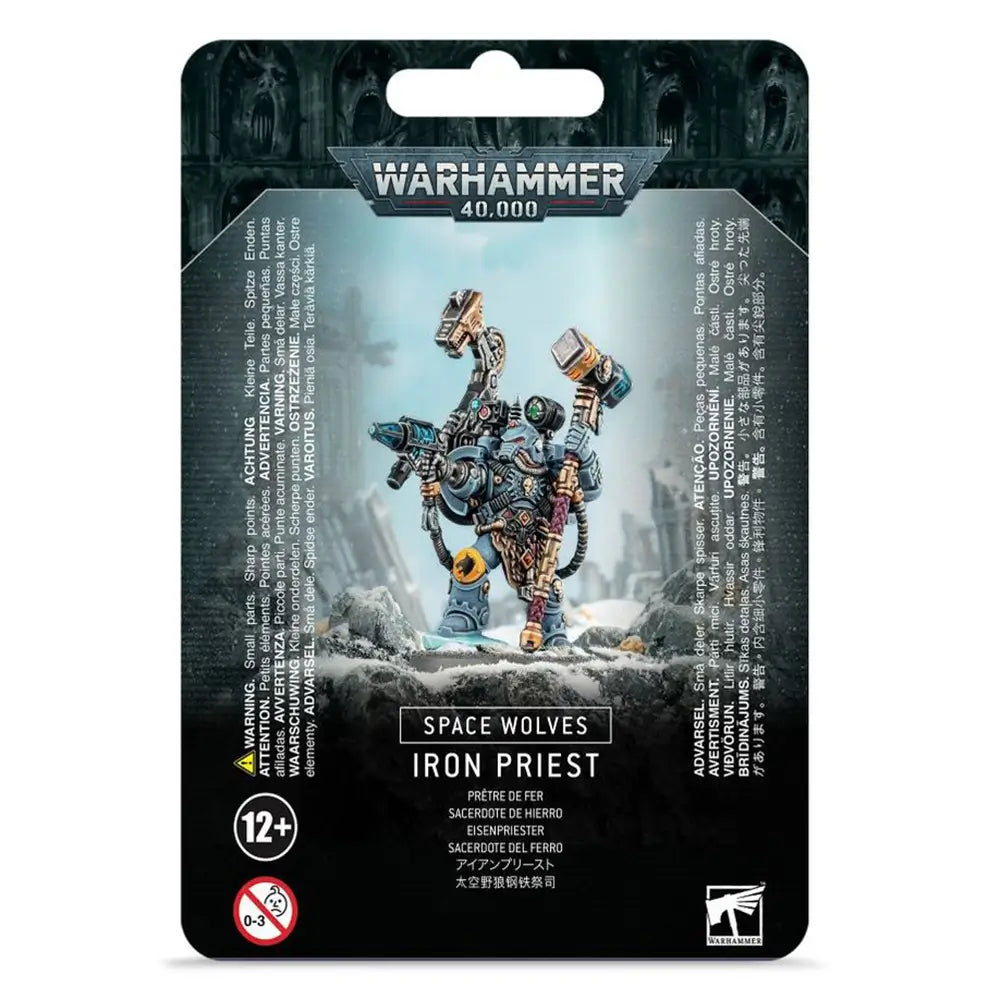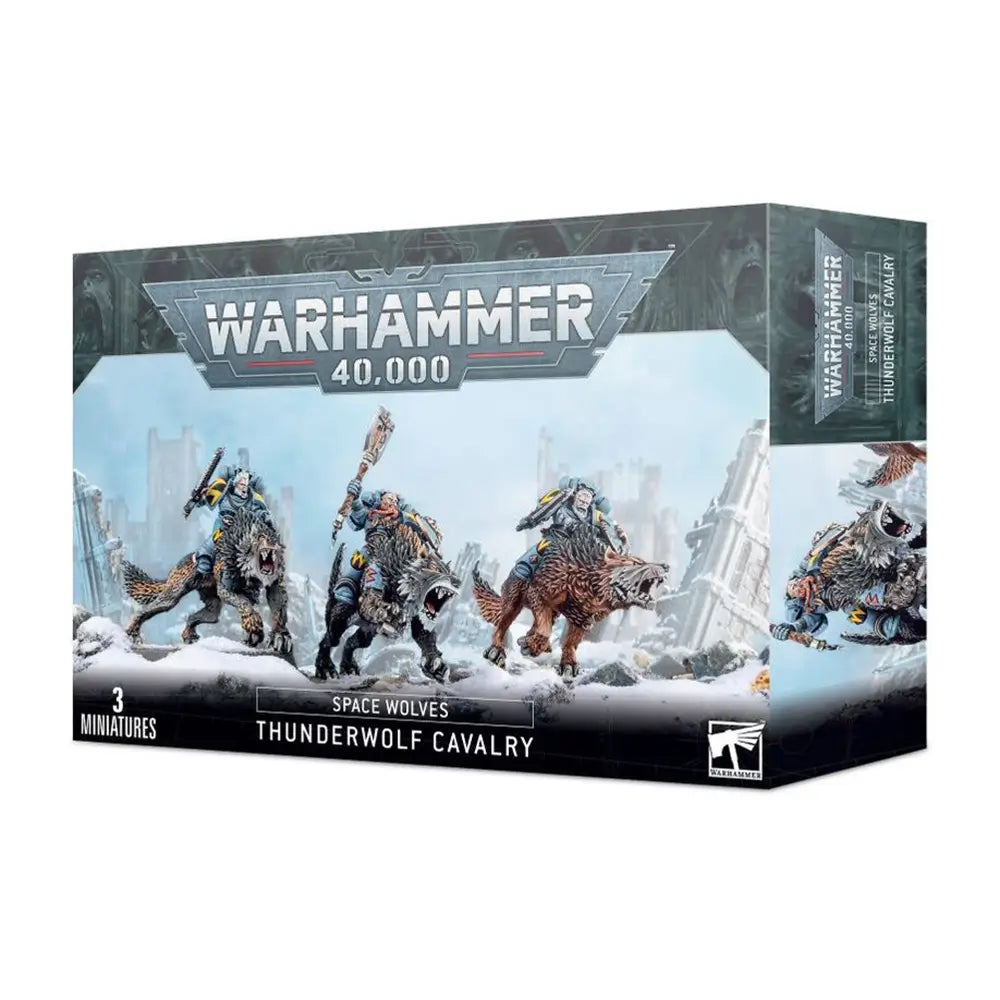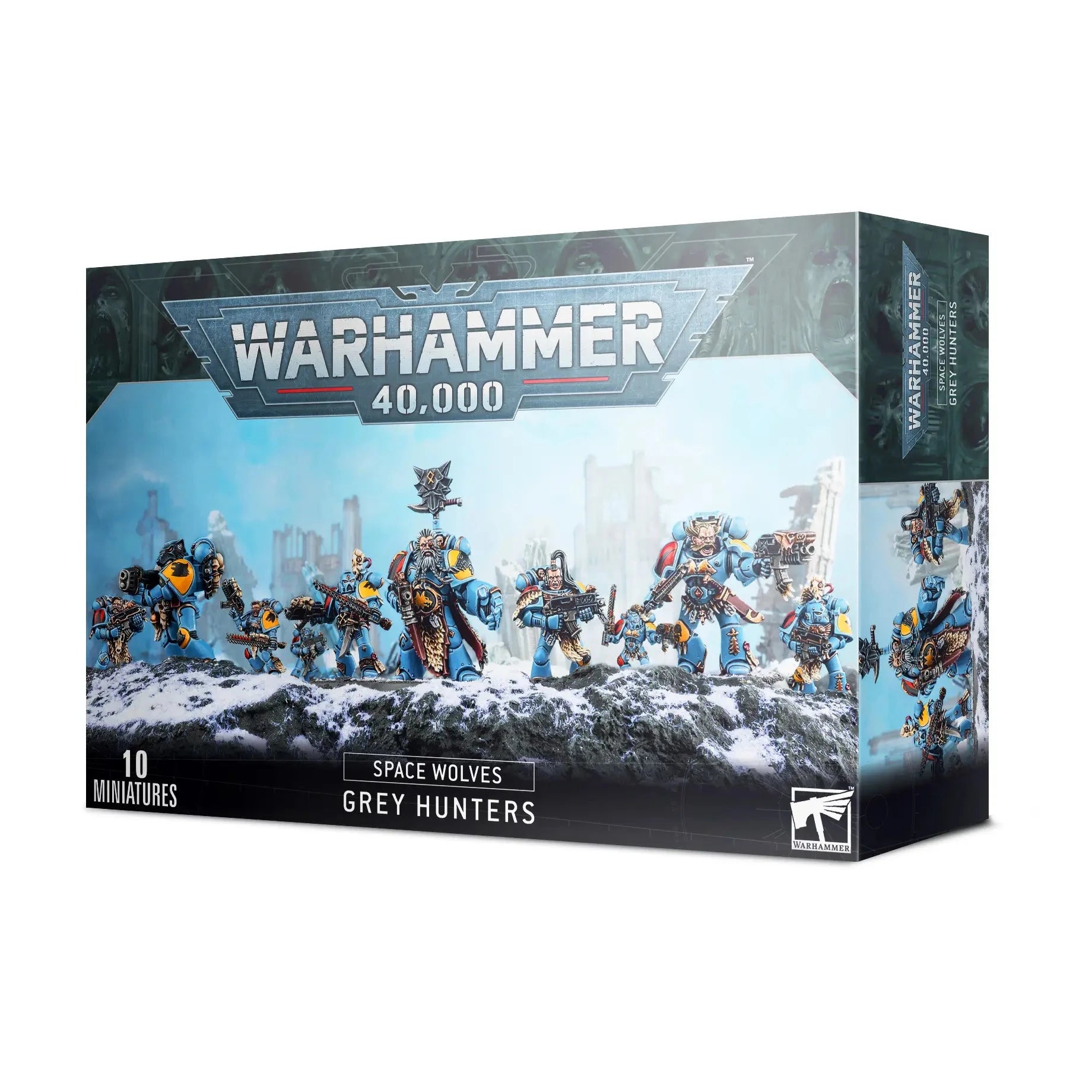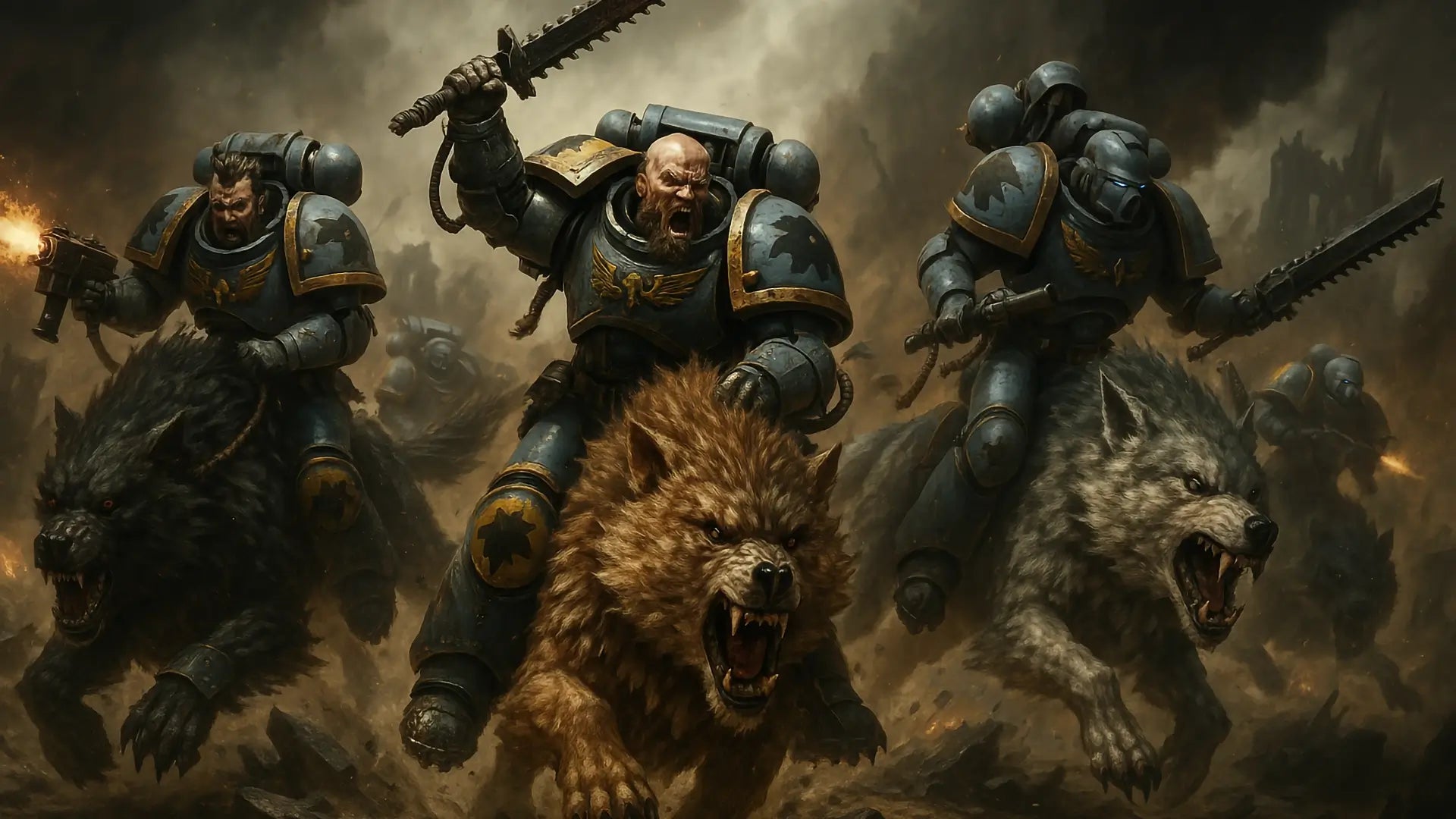
Space Wolves: Unleash the Savage Might of Fenris
Introduction – Welcome to the Pack!
Hey there, battle-brother! Do you hear the howl of Fenris calling? If you've ever been drawn to the savage warriors of the Space Wolves, you’re in the right place. Whether you're brand new to Warhammer 40K, considering playing Space Wolves, or a veteran looking to deepen your knowledge, this guide is for you.
Space Wolves are the most badass, wolf-riding, axe-swinging, Viking-inspired chapter of Space Marines in Warhammer 40K. They’re feral warriors from the ice world of Fenris, known for their brutal melee combat, deep sense of honor, and refusal to follow the Imperium’s strict rules—because why take orders when you can charge headfirst into battle like a legend?
New to the universe? Explore our full Warhammer 40K collection to find your first army or expand your forces.
By the end of this guide, you'll know exactly why the Space Wolves are an amazing faction, how to start an army, their strengths on the battlefield, and how to make them look epic on the tabletop. Let’s dive in!
The Origins of the Space Wolves – The Tale of Leman Russ

Who is Leman Russ?
Leman Russ is the Primarch of the Space Wolves, and honestly, he’s one of the most legendary figures in Warhammer 40K. By the way, want to learn more about the creators behind Warhammer? Check out our Comprehensive Games Workshop Guide. If you're good, let's get back into a breakdown of Leman Russ:
-
Crash-Landed on Fenris – As a baby, Russ was yeeted across the galaxy (like all the Primarchs) and ended up on Fenris, a brutal ice world full of monsters and warrior clans.
-
Raised by Wolves (Literally) – A pack of Fenrisian wolves took him in, and he grew up as their alpha before being found by a human tribe.
-
Became a Warrior King – Russ was smarter, stronger, and deadlier than any human, so he ended up leading the strongest tribe on Fenris.
-
Met the Emperor – When the Big E showed up to reunite his lost sons, Russ challenged him to three contests (eating, drinking, and fighting). He won the first two but got knocked out in the brawl, so he finally accepted the Emperor as his father.
-
Led the Space Wolves – Once he was put in charge of his own legion, he turned them into the most feared and savage Space Marines in the Imperium.
-
The Burning of Prospero – Russ was sent to deal with Magnus the Red and the Thousand Sons, which turned into an all-out massacre and one of the most tragic battles in 40K history.
-
Disappeared into the Warp – One day, Russ just vanished, claiming he’d return during the Wolftime, the Imperium’s darkest hour. The Space Wolves have been waiting ever since.
In short, Leman Russ is a wolf-raised, axe-wielding, beer-chugging warrior-god who was too wild for the Imperium but remains one of the Emperor’s most loyal sons. His return is one of the biggest unanswered mysteries in 40K.
The Space Wolves in the Great Crusade

Alright, buckle up because here’s the real story of the Space Wolves in the Great Crusade—no fluff, just straight-up legendary stuff.
The Great Crusade was the Emperor’s big mission to unite humanity—bring all the lost planets into the Imperium, wipe out the threats, and create a galaxy where mankind could thrive. Sounds nice, right? Well, not every world wanted to join the Imperium peacefully. And when talking didn’t work? That’s when the Space Wolves showed up.
Russ and his Wolves weren’t negotiators. They were executioners. If a planet resisted, the Wolves didn’t just conquer it—they wiped it off the map. Other Legions played by the book. The Space Wolves? They fought like beasts, struck like lightning, and left nothing behind but ruins and war stories.
How the Space Wolves Fought
The Wolves weren’t your standard Space Marines. They did things their way, and their way was terrifying.
-
No hesitation. If the Imperium gave them a target, that target was gone—fast, brutal, and final.
-
They fought like a pack. No rigid ranks, no overcomplicated strategy—just battle-brothers fighting alongside each other like warriors of old.
- They didn’t do diplomacy. They didn’t come to chat, they came to end the fight before it even started.
Other Space Marines respected them—but they also feared them. The Wolves were different. Too wild, too unpredictable.
Famous Battles – The Wolves Make Their Mark
One of their most badass moments came during the Pacification of Dulan. The planet’s ruler openly mocked the Emperor—and Russ took that personally. Instead of some grand, drawn-out battle, Russ stormed the guy’s palace and ripped him apart with his bare hands.
That set the tone. The Space Wolves weren’t just warriors, they were hunters. When they were sent in, the fight was already over before it began.
But then came Prospero. And that’s where things went south.
The Emperor told Russ to deal with the Thousand Sons, his brother Magnus’s Legion, because they were using sorcery (which was a big no-no). At first, Russ was just supposed to arrest Magnus and bring him in. But then Horus (already a traitor at this point) tricked him into thinking Magnus had gone full-on traitor.
So instead of taking prisoners, Russ and the Wolves burned Prospero to the ground. They slaughtered the Thousand Sons, destroyed their homeworld, and shattered their Legion.
Turns out, Magnus wasn’t actually a traitor—he was just an arrogant psychic nerd who made some bad calls. By the time Russ realized he’d been played, it was too late. The damage was done, and the Thousand Sons never forgave the Wolves. That rivalry still burns like a Fenrisian bonfire.
The Wolves and the Horus Heresy
After Prospero, Russ and the Wolves barely had time to recover before the real disaster hit: Horus turned traitor and launched the Horus Heresy.
Russ knew right away what needed to be done. Horus had to die. No second chances, no hesitation.
But the problem? The Wolves weren’t ready for another war. By the time they got moving, Horus had already reached Terra. Russ never made it to the final battle.
Think about that for a second. Imagine Russ on Terra, fighting alongside the Emperor. Maybe Horus wouldn’t have gotten as close to victory. Maybe the Emperor wouldn’t have been mortally wounded. Maybe everything would be different.
But the Wolves don’t dwell on what-ifs. They fight, they endure, and they wait. Because Russ isn’t dead—he vanished into the Warp, promising to return when the Imperium needs him most.
And when he does? The galaxy better be ready.
The Burning of Prospero

The Burning of Prospero is one of the biggest, most tragic, and most brutal events in Warhammer 40K history. It wasn’t just a battle—it was a full-on massacre, and it changed the fate of two Primarchs and their Legions forever. Let me break it down.
Why Did It Happen?
The short version? Magnus the Red messed up. Big time.
Magnus, Primarch of the Thousand Sons, was a genius and a master of sorcery (which the Imperium called “witchcraft” and absolutely hated). He saw himself as a scholar and a seeker of truth, but the problem was, his Legion’s powers came from the Warp—the same place demons and Chaos gods lurk.
The Emperor had already told Magnus not to mess with psychic powers too much. But did Magnus listen? Nope.
When Horus turned traitor, Magnus saw it happen through a vision. Instead of warning the Emperor the normal way, he decided to break into the Emperor’s mind using his psychic abilities. In doing so, he accidentally shattered the Emperor’s secret project—the Webway, a thing that could’ve saved humanity from the Warp. Oops.
Now, Magnus didn’t mean to destroy the Webway, but the damage was done. The Emperor was furious and ordered Leman Russ and the Space Wolves to bring Magnus in for punishment. At first, the plan was just to arrest him and bring him back to Terra. But then Horus (who was already a traitor at this point) manipulated Russ into believing Magnus was beyond saving.
So instead of arresting Magnus, Russ and the Space Wolves went to kill him and burn Prospero to the ground.
The Invasion – Wolves vs. Sorcerers
The Space Wolves hit fast and hard, and the Thousand Sons never saw it coming.
- The Wolves dropped from orbit like a meteor shower, storming the planet in full force.
- Thousand Sons fought back with insane psychic powers, hurling fire, lightning, and Warp magic at the invaders.
- The Wolves didn’t care—they pushed through it all, hacking through the Thousand Sons like a pack of rabid beasts.
It wasn’t a fair fight. The Thousand Sons were outnumbered, and worse—many of their own powers turned against them. Their psychic abilities started malfunctioning, and some of them even spontaneously combusted because of how unstable the Warp was.
By the time Russ reached Magnus, the battle was already over. The city was in flames, the Thousand Sons were shattered, and Prospero was a dead world.
Leman Russ vs. Magnus the Red – The Duel
This is where things get legendary.
Russ finally found Magnus, and the two Primarchs faced off in a brutal duel. Magnus, devastated by what was happening to his Legion, didn’t even want to fight at first. But Russ? He wasn’t holding back.
The two went at it, and at first, Magnus was winning. He was stronger, smarter, and his psychic powers were off the charts. He could’ve crushed Russ.
But here’s the thing: Magnus wasn’t fighting to kill. He still saw Russ as his brother. He held back.
Russ? He didn’t.
At the last moment, Russ lifted Magnus over his head and broke his spine over his knee. Bane-style.
That moment sealed everything. Magnus, crippled and broken, finally understood that there was no redemption for him or his Legion.
The Aftermath – Regret and Rivalry
-
Leman Russ realized too late that he’d been tricked. He wasn’t supposed to destroy the Thousand Sons—only bring Magnus in. He had fallen for Horus’s manipulation, and the guilt haunted him for the rest of his life.
-
Magnus, once a proud son of the Emperor, fully embraced Chaos. He had no choice. He was broken, exiled, and betrayed. He became a Daemon Primarch of Tzeentch, forever changed by the events of that day.
- The Wolves and the Thousand Sons became eternal enemies. The hatred between them never died. Even now, 10,000 years later, their war still rages on.
The Fall of the Thousand Sons
With their Primarch broken, the Thousand Sons were finished. Magnus, in one last desperate act, used his remaining strength to open a Warp portal and teleport his surviving sons to the Planet of the Sorcerers, a new home gifted to him by Tzeentch, the Chaos God of Change.
And just like that, the Thousand Sons—once loyal warriors of the Emperor—became a Chaos Legion.
To summarize this all up, Magnus broke the Emperor’s Webway project trying to warn him about Horus. The Emperor got pissed and sent Leman Russ to arrest him, but Horus tricked Russ into wiping out the Thousand Sons instead. The Space Wolves invaded Prospero, torched the planet, and nearly wiped out the Thousand Sons. Russ broke Magnus over his knee, and Magnus, realizing he had no future in the Imperium, fled into the Warp and joined Chaos.
Russ regretted it. Magnus never forgave him. And now their Legions hate each other for all eternity.
The Disappearance of Leman Russ

Leman Russ disappearing is one of the biggest mysteries in Warhammer 40K. Unlike most Primarchs who either died, turned to Chaos, or are in stasis, Russ just vanished—and nobody knows exactly where he went or why. Here’s what we do know:
Theories About Russ’s Disappearance
| Theory | What It Means | Why It Makes Sense |
|---|---|---|
| Into the Warp to Hunt Chaos | Russ is fighting daemons nonstop in the Eye of Terror | He hates Chaos and wouldn't run from a fight |
| Searching for the Tree of Life | Trying to heal the Emperor and save the Imperium | Honorable goal, fits the mythic tone |
| Waiting for the Wolftime | Hiding until the Imperium is at its worst | Prophecy-driven, fits the legend vibe |
| Ascended to Something Greater | Became a supernatural force or spirit warrior | He's been in the Warp for 10,000 years—who knows? |
The Feast of the Wolf Time – Russ’s Last Known Moments
One day, Russ gathered his closest warriors—his Wolf Guard—for a massive feast. This wasn’t just any party. Russ, normally the rowdiest and most fun-loving Primarch, was weirdly serious that night. Something was on his mind.
During the feast, he stood up and basically said, "I’m going on a journey. I don’t know when I’ll be back, but when the Wolftime comes, I’ll return."
Then, just like that, he left. No explanation, no goodbyes, just gone.
The only ones who might have known where he went were his Wolf Guard, and they refused to speak about it. They kept his secret, and over time, they all vanished too, one by one.
Why Did Russ Leave? Theories & Myths
Nobody knows for sure, but there are a few major theories about what happened to him:
1. He Went Into the Warp to Hunt Chaos
- This is the most popular theory.
- Russ may have gone into the Eye of Terror to fight Chaos on its own turf.
- He always hated Chaos, and after what happened at Prospero, he probably felt responsible for letting it grow stronger.
- If this is true, he’s been battling daemons for 10,000 years straight.
2. He’s Searching for the Tree of Life
- Some legends say Russ is looking for the Tree of Life, a mythical thing that could supposedly cure the Emperor and bring him back.
- If true, it means Russ wasn’t just looking to fight—he was looking to fix what was broken.
3. He’s Preparing for the Wolftime
- Russ said he’d return for the Wolftime, but what does that mean?
- Some think it’s a prophecy about a final war that will tear the Imperium apart.
- If that’s the case, Russ is waiting for the moment when the Imperium is at its absolute worst before he makes his comeback.
4. He Ascended to Something Greater
- Some fans believe Russ might not just be a Primarch anymore.
- If he’s been fighting in the Warp for so long, maybe he’s changed—possibly even turned into some kind of immortal warrior spirit.
Out of the four theories, I think that the most likely reason Russ left is that he went into the Warp to fight Chaos. Here's why I think this makes the most sense:
Russ hated Chaos more than anything.
- He personally fought Magnus and saw firsthand what Chaos did to the Thousand Sons.
- He knew Horus fell to Chaos and that the Imperium was in deep trouble.
- Russ never ran from a fight—so if Chaos was growing stronger, of course, he’d go after it.
The 13th Great Company also disappeared into the Warp.
- The Space Wolves' 13th Great Company (some of their most hardcore warriors) followed Russ and vanished too.
- These guys weren’t just any Wolves—they were the craziest and most feral of them all.
- If they all disappeared at the same time, it sure seems like they followed their Primarch into a war against Chaos.
The Imperium was already stable (for the moment).
- Russ left at a time when the Imperium wasn’t totally crumbling.
- Guilliman and the other Primarchs were still around, so it wasn’t an “all hope is lost” situation.
- That makes it less likely that he was waiting for the Wolftime—because things weren’t THAT bad yet.
His whole vibe was about being a warrior, not a seeker.
- Russ was a fighter, not a mystic or a philosopher.
- Searching for the Tree of Life doesn’t fit his character. That sounds more like something Magnus or the White Scars would do.
- If he was preparing for some future war, he probably would’ve left more instructions or trained successors. Instead, he just left and vanished—like he was chasing something urgent.
What Do the Space Wolves Believe?
The Space Wolves 100% believe Russ is coming back. Unlike other Legions, they don’t think their Primarch is dead or lost forever.
- Every year, they hold a feast in his honor, leaving an empty seat at the table for him.
- They send warriors called The Wolfblade to serve on Terra, waiting for the day he returns to lead them again.
- The 13th Great Company (a lost group of Space Wolves) actually went into the Warp looking for him and haven’t been seen since.
Will Russ Ever Come Back?
Warhammer 40K is a grimdark universe where things rarely have happy endings, but if there’s one Primarch who seems destined to return, it’s Leman Russ.
- Guilliman came back, so it’s not impossible.
- The Imperium needs him now more than ever with Chaos and Xenos threats everywhere.
- The whole “Wolftime” prophecy suggests his return is tied to a final, catastrophic war.
If he does return, it’s gonna be absolutely insane. Imagine the most savage Primarch, hardened from 10,000 years of fighting in the Warp, stepping back into the Imperium. That’s an entrance that would shake the entire galaxy.
The Culture of the Space Wolves – Warriors of Fenris
The Trial of Morkai

It’s the Space Wolves' recruitment test, and calling it a “trial” is putting it lightly. It’s more like a nightmare survival gauntlet that turns feral teenagers into legendary warriors—or kills them trying.
When the Space Wolves pick potential recruits—usually from the brutal warrior tribes of Fenris—they don’t hand them a sword and say “good luck.” No, they throw them into the wild of Fenris with nothing and say, “Survive.”
So what happens during the trial?
Key Elements of the Trial of Morkai
| Challenge | What It Tests |
|---|---|
| Monster-infested wilderness | Survival instincts and fearlessness |
| No gear or supplies | Resourcefulness and resilience |
| Hostile weather | Endurance and adaptability |
| Other recruits turning hostile | Loyalty, instinct, and judgment |
It's a test of everything, including survival skills, physical toughness, mental strength, loyalty, and honor (yeah, they're watching for that too). If you make it out alive? You’ve proven you’ve got what it takes to even be considered for the next step.
Why’s It Called the Trial of Morkai?
Morkai is the mythical twin-headed wolf in Fenrisian legend who guards the gates of death. Going through the trial means walking that line between life and death, just like those who pass into Morkai’s domain.
It’s symbolic, brutal, and perfectly Space Wolves. You’re literally proving you’re not just another warrior—you’re meant to walk with the gods.
What Happens After?
If you survive—and that’s a huge “if”—you’re taken back to The Fang, their massive fortress-monastery. There, the real transformation begins:
You undergo implantation with the Canis Helix (their gene-seed), which starts turning you into a Space Marine.
But the Canis Helix is mutated like crazy, so there's a chance it’ll turn you into a savage beast instead of a noble warrior. (Think werewolf nightmare.)
If you lose control and become a Wulfen... well, your path as a traditional Space Wolf ends there.
The Canis Helix

The Canis Helix is a unique genetic mutation added to the Space Wolves' gene-seed. It’s what gives them their superhuman abilities, but with a very wolfy twist. Every Space Marine chapter gets enhanced physically through gene-seed, but the Canis Helix is on a whole other level.
It gives Space Wolves:
- Heightened senses—smell, hearing, vision. Seriously, they can track you by scent through a blizzard.
- Increased strength, speed, and aggression.
- A bit of a temper. Okay, a lot of temper.
- Slightly longer fangs and more rugged features (some even grow a bit of fur).
But here's the kicker: this stuff is unstable.
The Curse of the Wulfen

Because the Canis Helix is so messed up, not everyone handles it the same way. Sometimes, instead of becoming a noble super-soldier, a recruit will slowly (or suddenly) start to lose their humanity. The result? They turn into a Wulfen—a horrifying, half-wolf, half-Space Marine beast driven by instinct and rage.
Wulfen:
- Walk on two legs but look like massive, muscular werewolves.
- Are insanely fast and brutal in combat.
- Can tear through tanks and infantry like a blender on legs.
- Don’t speak or strategize. They just hunt, kill, and howl.
Once someone starts changing, there’s no stopping it. They’re gone. They’re not Space Marines anymore—they’re something else entirely.
Pack Mentality

It’s the idea that every Space Wolf is part of a pack, just like wolves in the wild. They fight together, live together, and watch each other’s backs—no lone wolves here (ironically).
They don’t see themselves as rank-and-file soldiers. Instead, they’re:
- Brothers-in-arms first
- Warriors bound by shared trials
- Members of a tight-knit unit where loyalty and respect are earned, not given through titles
How Does It Work in Practice?
- Units = Packs: Each squad is basically a pack, led by the strongest or most experienced—not always the one with the highest official rank.
- Leaders = Alphas: Wolf Lords, Wolf Guard leaders, even squad leaders—they’re respected because they’ve proven themselves, not because someone gave them a badge.
- Decisions are instinctual: In battle, Wolves often rely on gut instincts and mutual trust, not strict orders from a chain of command. They know how each other fights. It’s almost like they’re synced.
- They howl together, fight together, and die together. No one gets left behind.
Why Is This So Different from Other Space Marines? Most other Space Marine chapters are super formal and structured—they follow the Codex Astartes like it’s holy scripture. The Space Wolves?
They treat that thing like a suggestion pamphlet they immediately tossed into a fire.
They’re not big on salutes and rigid ranks. They’re about respect, honor, and strength. You don’t lead because of a title—you lead because your brothers choose to follow you.
The Personality Side of It
Because of this mindset, Space Wolves tend to be:
- Fiercely loyal—not just to the Emperor, but to each other
- Blunt and honest—they don’t have time for politics or flattery
- Rough around the edges—but they’re some of the most dependable warriors you’ll ever fight beside
They love battle, they love storytelling, and they love celebrating each other's victories. They're like a bunch of rowdy Viking brothers who never forgot the meaning of family.
Rune Priests vs. Librarians

Ohhh this is a fun one—because it shows just how different the Space Wolves are, even when they’re doing the same thing as everyone else. Let’s talk about Rune Priests vs. Librarians—two types of psykers (basically space wizards), but with very different vibes.
| Aspect | Librarian | Rune Priest |
|---|---|---|
| Chapter Origin | All standard Space Marine chapters | Space Wolves exclusive |
| Role | Psyker/Scholar | Psyker/Shaman |
| Power Source | The Warp (scientific view) | The Spirit of Fenris / Elemental forces |
| Visual Style | Blue armor, Imperial iconography | Runes, wolf pelts, primal visuals |
| Thematic Vibe | Disciplined psychic warrior | Elemental stormcaller |
What’s a Librarian in Warhammer 40K?
In most Space Marine chapters, a Librarian is a psyker who taps into the Warp to use powerful abilities—like shooting lightning, messing with enemy minds, or shielding allies.
- They wear blue armor (even in other-colored chapters).
- They're usually quiet, mysterious, book-smart types.
- They study the Warp like a science, and try to control it with logic and discipline.
- Super Codex Astartes-compliant.
Think Jedi Knight meets college professor.
What’s a Rune Priest?
Now take everything I just said... and throw it into a snowstorm on Fenris. A Rune Priest is the Space Wolves' version of a psyker, but they’re nothing like Librarians.
- They don’t call it the Warp. They say they’re using the spirit of Fenris, the howl of the storm, or the wrath of the gods.
- Their powers are themed around ice, lightning, storms, and primal fury.
- They carve runes into their armor and weapons, and those runes are said to channel ancient power.
- They’re more like shamans or storm-callers than scholars.
Imagine a Norse seer with the power of Thor, and you’re close.
So… Same Powers, Different Flavor?
Basically, yeah. Mechanically, both Rune Priests and Librarians are psykers with powerful battlefield abilities. But thematically, Rune Priests are deeply rooted in the Space Wolves’ culture and spirituality, not the Imperium’s bureaucracy.
Where Librarians say: “I am harnessing the Warp through sanctioned psychic discipline.”
A Rune Priest says: “The storm answers my call, and death follows in its wake.”
Same effect. Different soul.
Why This Matters
Space Wolves reject the Codex Astartes (the big rulebook all other Marines follow). They don’t like being told how to run things. Calling their psykers “Librarians” would feel way too Imperial. So, they follow their own path—with Rune Priests leading the way, storm and lightning in hand.
Also, fun fact: other chapters have always been a little nervous about Rune Priests. They think their powers look a bit too much like sorcery—which is ironic, considering the Wolves were sent to destroy the Thousand Sons for exactly that.
Wolf Priests Instead of Chaplains

Wolf Priests are one of the most uniquely badass things about the Space Wolves. While other Space Marine chapters have Chaplains and Apothecaries, the Space Wolves just looked at both roles and went: “Nah. We’ll just make one guy do both. And make him terrifying.”
What’s a Chaplain?
In most Space Marine chapters, a Chaplain is the spiritual leader. He keeps the faith strong, reminds the Marines of their duty, and leads them in chants, prayers, and battle oaths.
- Skull-faced helmet? Check.
- Super intense speeches? Check.
- Keeps morale high and purges heresy with a crozius (big ol’ mace).
Very serious, very formal, very “let’s all read from the Codex together.”
What’s an Apothecary?
They’re the medics. They:
- Patch up injured Marines in the field.
- Retrieve gene-seed from the fallen (which is sacred).
- Make sure their battle-brothers live to fight another day—or die with honor.
Now Enter: The Wolf Priest
A Wolf Priest is both Chaplain and Apothecary, but with a savage, Fenrisian twist.
- He’s a spiritual guide, yes—but he doesn’t recite Imperial scripture. He tells legends, sagas, and tales of heroism, inspiring the pack with the history and glory of the Space Wolves.
- He’s a healer, but also the one who chooses who gets the Canis Helix (i.e., who becomes a Space Wolf). He knows the lore and the biology.
- He carries a Crozius, sure—but his version probably has wolf teeth and runes carved into it.
Imagine a cross between a battlefield priest, a shaman, and a grizzled combat medic who’s seen some stuff—that’s your Wolf Priest.
| Aspect | Chaplains (Other Chapters) | Wolf Priests (Space Wolves) |
|---|---|---|
| Primary Role | Spiritual leader and morale officer | Spiritual leader AND battlefield medic |
| Visual Theme | Skull-helm, purity seals, sacred symbols | Wolf bones, fangs, runes, savage appearance |
| Spiritual Style | Imperial prayers and Codex doctrine | Oral sagas, hero myths, tribal honor |
| Combat Role | Inspires troops and purges heretics | Leads charges, heals allies, and selects recruits |
| Codex Compliance | Strictly follows Imperial standards | Totally ignores Codex Astartes—follows Fenrisian tradition |
The Vibe Difference
Chaplains: “Let us pray to the Emperor and follow the Codex.”
Wolf Priests: “Remember the saga of Bjorne Stormfist, who shattered a Hive Tyrant’s skull with his own knee. That’s how you’ll be remembered, brother.”
One is like a strict Sunday school teacher. The other’s more like your grumpy-but-legendary uncle who’s telling war stories and patching up your wounds at the same time.
Why It Works for the Wolves
Space Wolves don’t need a Chaplain standing over them with dogma. They need someone who understands honor, instinct, and tradition. Wolf Priests embody the soul of the Space Wolves—they keep the flame of Fenris burning while making sure their brothers are strong in both spirit and body.
Views on the Imperium

The Space Wolves are technically part of the Imperium… but let’s be real: they don’t exactly play nice with it.
They’re like that one guy on the team who gets results, fights harder than anyone, but refuses to show up to meetings, never answers emails, and cusses out the boss when the boss oversteps.
Space Wolves vs. Traditional Space Marines
Here’s how the Sons of Russ break the mold—and why they’re so loved because of it.
| Aspect | Codex-Compliant Chapters | Space Wolves |
|---|---|---|
| Command Structure | Strict ranks per Codex Astartes | Pack-based, honor-driven leadership |
| Naming Conventions | Tactical, Devastator, Assault squads | Blood Claws, Grey Hunters, Long Fangs |
| Spiritual Beliefs | Imperial Cult and Codex doctrine | Fenrisian mythology, oral sagas, and gods |
| Psykers | Librarians (blue armor, scholarly) | Rune Priests (storm-callers, spiritual) |
| Relationship with Imperium | Obedient to High Lords and Inquisition | Fiercely independent, often defiant |
| Codex Astartes | Strictly followed | Openly rejected |
| Recruitment | Trials, screening, psychological testing | Trial of Morkai—survive monster-infested wilderness |
Loyal to the Emperor, Not the Bureaucracy
This is the core of how they operate:
- They LOVE the Emperor—like, legit worship the guy as a father and a god (even if they won’t say it out loud).
- But they don’t trust the High Lords of Terra, the Administratum, or the Inquisition one bit.
- In their eyes, the Imperium is full of pencil-pushers, schemers, and cowards who hide behind rules instead of fighting for what matters.
They see themselves as warriors of truth and honor, not slaves to a dying empire wrapped in red tape.
Big Middle Finger to the Codex Astartes
When Roboute Guilliman wrote the Codex Astartes (basically the Bible for Space Marines), the Space Wolves took one look at it and said: “Nah, we’re good.”
- They refused to break up into smaller Chapters.
- They kept their own ranks, traditions, and leadership structure.
- They still operate like a massive tribal warband, because it works for them.
And honestly? They were right. They've survived for over 10,000 years doing things their way.
Clashes with the Inquisition
The Wolves have had multiple throwdowns with the Inquisition over the centuries. The most infamous?
The War of the Beast / War of the Fang—when the Inquisition tried to seize control of the Fang and “purge” what they saw as mutation (aka the Wulfen).
The Wolves’ response? “Come at us.”
They defended their home world with everything they had and kicked the Inquisition’s butt hard enough that they still hold a grudge to this day.
So... Are They Rebels? Or Just... Wolves?
It’s complicated. They’re not traitors. Far from it. But they absolutely won’t bow to corrupt institutions or self-righteous bureaucrats. Their loyalty is to:
- The Emperor,
- Their Primarch, Leman Russ,
- And their brothers in the pack.
Everything else? Earns their respect—or gets out of their way.
The Unique Units of the Space Wolves

HQ Units – The Mightiest Warriors of Fenris
Legendary Space Wolves HQ Units
| Hero | Role/Title | Battlefield Strength |
|---|---|---|
| Logan Grimnar | Great Wolf | Leads on Stormrider chariot with powerful command buffs |
| Bjorn the Fell-Handed | Venerable Dreadnought | Ancient warrior with heavy firepower and resilience |
| Ragnar Blackmane | Youngest Wolf Lord | Lighting-fast melee strikes and heroic aura |
| Njal Stormcaller | Rune Priest | Master of storm-based psychic powers |
| Ulrik the Slayer | Wolf Priest | Inspires nearby units and supports through lore and healing |
Elite Units – The Fangs of Fenris
Elite Space Wolves Units
| Unit | Type | Role on the Battlefield |
|---|---|---|
| Thunderwolf Cavalry | Mounted Assault | Close-combat Marines riding massive Fenrisian wolves |
| Wulfen | Mutated Infantry | Savage melee shock troops with berserk power |
| Murderfang | Dreadnought | A feral, uncontrollable dreadnought designed to rampage through enemy lines |
Troops & Vehicles
Core Troops and Vehicles
| Unit | Role | Battlefield Function |
|---|---|---|
| Grey Hunters | Core Troop | Versatile, balanced frontline soldiers |
| Blood Claws | Assault Troop | Young, aggressive Marines best used in melee |
| Long Fangs | Heavy Support | Devastating ranged firepower; best at taking out vehicles or elite units |
| Stormfang Gunship | Aerial Assault | Flies over enemy lines delivering firepower and troops |
Conclusion – Join the Pack Today!
The Space Wolves are an amazing faction with deep lore, powerful units, and an aggressive, fun playstyle. Whether you’re looking for an army that feels different from traditional Space Marines, love the Viking/wolf aesthetic, or just want to ride into battle on giant wolves, this is the faction for you!
Feeling the call of Fenris? Check out our Space Wolves sets and start your army today! Join the pack!
If You Enjoyed This Article
Products For You
- Choosing a selection results in a full page refresh.
!

